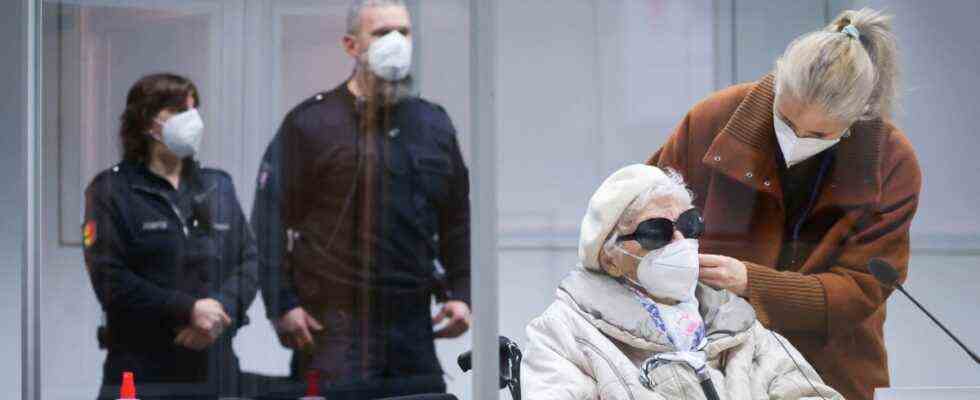She would like to forget. The concentration camps, the labor camp. Auschwitz, Stutthof, Thorn. But it doesn’t work. “You can’t forget the beatings and the fear and hunger,” says Towa-Magda Rosenbaum. “That has stayed in my heart all my life, until today.” That is why she is sitting at home in Israel on this Tuesday morning at the age of 97 in front of a computer camera and in this Nazi trial tells what she wants to forget and what she cannot forget.
Her testimony is transmitted via video to screens in this room, and the Itzehoe District Court is sitting in a converted warehouse. Sitting in a wheelchair there is Irmgard F., 96, secretary to the commander of the Stutthof concentration camp from 1943 to 1945 and now accused of being an accessory to murder in more than 11,000 cases.
They were two young women at the time, they know and didn’t know each other. More than three quarters of a century later, the then typist is now the accused and the former prisoner is a witness and one of more than 30 joint plaintiffs in this trial. Irmgard F. seems stoic as always when Holocaust survivor Rosenbaum starts on day 14 of the main hearing. As if none of this was her business.
Towa-Magda Rosenbaum wears a lilac-colored bonnet and a light-colored cape. She was born in Hungary in 1924, had a happy childhood, her father was a rabbi, he often sent the children out into the fresh air. She believes all the exercise later helped her stay alive. In 1944 the family was deported to Auschwitz, and the Nazis pushed ahead with the systematic extermination of Hungarian Jews. Towa-Magda’s younger brother stayed behind and was murdered. Her parents were segregated at the ramp in Auschwitz and then killed. Her mother’s last words were addressed to her older sister: “Take care of Magda.”
The siblings were deported to the Stutthof concentration camp, arriving on August 16, 1944. On August 22, 1944, Towa-Magda Rosenbaum, who went by her maiden name, turned 20, her 20th birthday in the concentration camp. She tells of a song about wanting to be 20 years old and that she sang that night: “I never want to be 20 years old,” she laughs bitterly. “For me, 20 was the worst time of my life.”
A wooden club with leather, the skin burned for hours
The beatings, “they destroyed us, physically and mentally”. A wooden club with leather, the skin burned for hours. A barracks guard named Barbara dumped dirty water over her head. A barracks guard named Max told them that “soap” would become of them. They didn’t understand that until they later heard that bodies from Stutthof had been made into soap. They commemorated the year after with a ceremony in the Jewish community.
Instead of using Hungarian or Hebrew in her mother tongue, Towa-Magda Rosenbaum describes it all in broken German, although she only once had German at school. She sometimes mixes in an English word like “family”. It’s sometimes tedious, but authentic, because her lawyer Markus Horstmann is right next to her.
In autumn 1944 they had to walk from Stutthof to the AEG Thorn-Winkenau subcamp. Forced labor until death, 900 of 3,000 girls were left, “without gas,” says Towa-Magda Rosenbaum. The exhaustion, the hunger. She was “jealous” about the dead, jealous. “Don’t die,” she begged the living anyway, “you’ll be free,” before Russian soldiers came and they were free.
She returned home with her sister, almost the whole family was dead, the house destroyed. Her lawyer Horstmann shows portraits of her before and after, a pretty, radiant woman and a serious, marked woman. She left communist Hungary with her husband, who had survived Auschwitz, and moved to Israel. A new life with two children haunted by memories. “Terrible dreams,” says Rosenbaum. “We want to be normal people, but inside,” she calls it, “we’ve always remained defective.” She wishes: “Everyone should live quietly, in their country, with their family, God should help to forget,” then the video link between Itzehoe and Israel is over.

